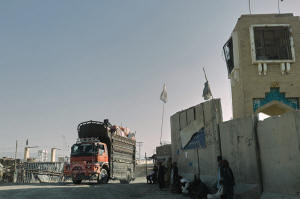Pakistan says peace talks with Afghanistan's Taliban government in
Istanbul failed after 4 days
[October 29, 2025]
By SUZAN FRASER and MUNIR AHMED
ANKARA, Turkey (AP) — Peace talks between Pakistan and Afghanistan have
failed in Istanbul after four days of negotiations, Pakistan’s
information minister said early Wednesday, accusing the Taliban
government in Kabul of refusing to act against militants blamed for
deadly cross-border attacks.
The talks followed an earlier round in Doha that produced a ceasefire on
Oct. 19 after deadly border clashes between the two sides left dozens
dead, including soldiers, civilians and militants.
However, the ceasefire was still holding and no new clashes were
reported between Pakistan and Afghanistan hours after the talks
collapsed.
Pakistan accuses the Taliban of harboring militants linked to a surge in
attacks, while Kabul denies its territory is being used against
Pakistan.
Before dawn Wednesday, Pakistan's Information Minister Attaullah Tarar
took to social media platform X, saying the dialogue “failed to bring
about any workable solution,” despite mediation by Qatar and Turkey.
Kabul had no immediate comment.
The latest development came hours after state media in both countries
said there was an impasse in the talks, with the state media from the
both sides blaming each other for the failure to reach a deal.
Tarar said Pakistan at the request of brotherly countries Qatar and
Turkey gave peace a chance and engaged with the Afghan Taliban
government first in Doha and then in Istanbul.
He accused the Taliban of being “indifferent to Pakistan’s losses" even
though “Pakistan has always desired, advocated and immensely sacrificed
for peace and prosperity for the people of Afghanistan.”

Tarar said Pakistan was thankful to Qatar and Turkey for facilitating
this dialogue, which was part of a broader diplomatic push to ease
months of heightened tension between Islamabad and Kabul over
cross-border attacks and militant safe havens — issues that have
strained relations since the Taliban’s return to power in Afghanistan
four years ago.
He said that “since the Taliban regime bears no responsibility towards
the people of Afghanistan and thrives on war economy, it desires to drag
and mire the Afghan people into a needless war."
Tarar said "Pakistan’s patience has run its course,” and warned that
Islamabad would “continue to take all possible measures necessary to
protect our people from the menace of terrorism.”
Earlier, on Tuesday, three Pakistani security officials who had direct
knowledge of the negotiations told The Associated Press that there was a
deadlock in the talks in Istanbul over the reluctance of Kabul in
accepting demands about assurances that Afghan soil not be used against
Pakistan.
The officials spoke on condition of anonymity because they were not
authorized to speak to the media. They said the host country was trying
to end the deadlock so that the final round of the talks could resume as
soon as possible.
[to top of second column]
|

People wait near the closed gate at the Spin Boldak border crossing
with Pakistan, after the border was shut for nearly two weeks
following clashes between Afghan and Pakistani forces, in Kandahar
province, Afghanistan, Thursday, Oct. 23, 2025. (AP Photo/Sibghatullah)

According to the Pakistani officials, the Taliban delegation was
“not fully willing” to accept Pakistan’s proposals and continued to
seek guidance from Kabul before making decisions.
Afghanistan-controlled media RTA made similar accusations against
the Pakistani side, saying Kabul “made every effort to hold
constructive talks,” but that the “Pakistani side does not seem to
have this intention.”
As the latest round of the talks was underway in Turkey, U.S.
President Donald Trump on Sunday pledged to help resolve the crisis
between the two neighbors very quickly.
The recent fighting prompted Qatar to host the initial round of
talks, which produced a ceasefire that both sides say is still
holding despite the stalemate in Istanbul.
Islamabad-based security analyst Syed Mohammad Ali on Tuesday said
Afghanistan’s strategy at the talks was to slow the diplomatic
process and shift focus to other bilateral issues. He noted
Afghanistan’s “reluctance to give clear, unambiguous and
internationally verifiable commitment to act against
Afghanistan-based Pakistani Taliban and other militants.”
Pakistan has seen a surge in militant attacks in recent years,
mostly blamed on the Pakistani Taliban, or Tehrik-e-Taliban
Pakistan, a group closely allied to the Taliban in Afghanistan.
Islamabad says the group is being sheltered in Afghanistan since the
Taliban seized power in 2021.
Authorities in Pakistan have said the country's military earlier
this month targeted hideouts of the TTP in Afghanistan. It triggered
deadly clashes between the two countries until Qatar brokered the
ceasefire.
All border crossings between the two sides have remained shut for
more than two weeks, with trucks carrying goods stranded pending the
reopening of key trade routes.
___
Ahmed reported from Islamabad. Associated Press writer Abdul Qahar
contributed to this story from Jalalabad, Afghanistan.
All contents © copyright 2025 Associated Press. All rights reserved
 |